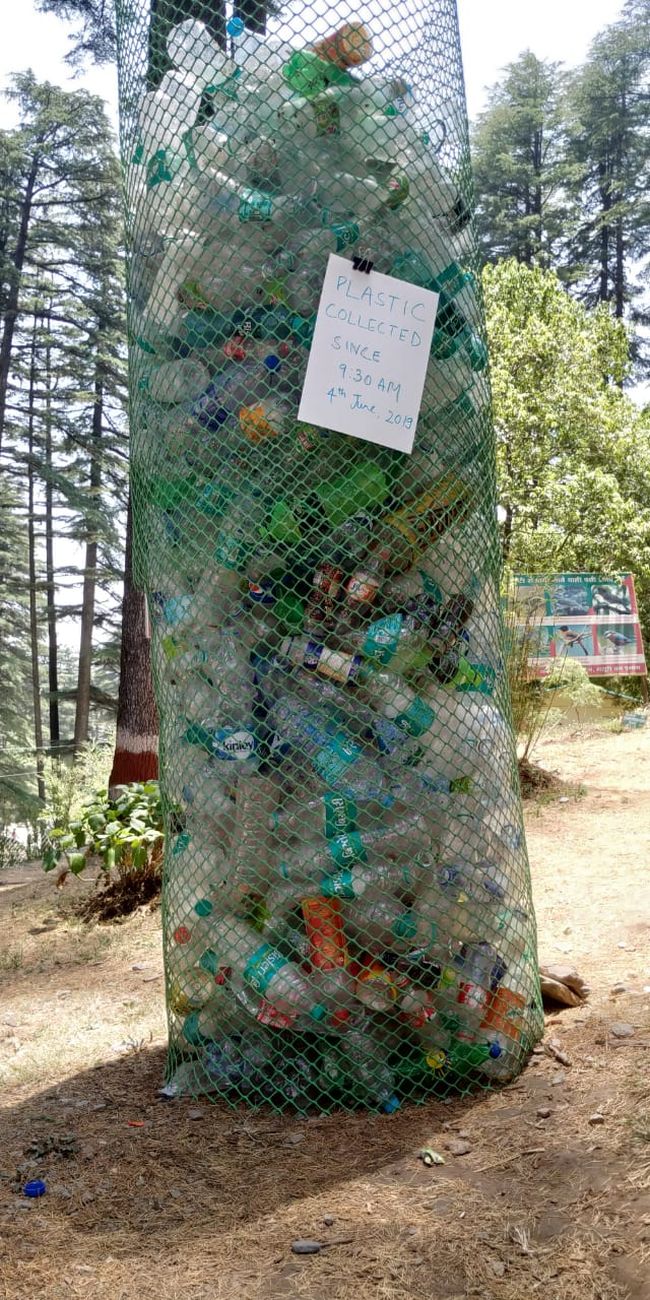New Delhi: Around 32 km ahead of the queen of hills Mussoorie, is a small and pretty hill station called Dhanaulti. From iconic temples, adventure camps, eco park, to stepped potato cultivation, make Dhanaulti one of the major tourist destinations. As per the Ministry of Tourism, Dhanaulti witnesses two lakh tourists from April to September, every year. The number of tourists visiting the mountainous beauty increases by 15-20 per cent annually. The rise in footfall goes hand in hand with the increase in the amount of waste generated and subsequently burnt as the town has no landfill, so all the waste is dumped down the valley and set on fire. In a bid to maintain the beauty of the hill station Dhanaulti and promote clean and green hill station, Chintan, a Delhi based NGO, is working in partnership with Uttarakhand Forest Resource Management (UFRM) and Japan International Corporation Agency (JICA) since 2018.
As part of the same initiative, ahead of the 46th World Environment Day on June 5, the team had organised a two day (June 3-4) awareness programme at an eco park, a major tourist spot in Dhanaulti. Talking to NDTV about the same, Chitra Mukherjee, Head of Programmes, Operations, Chintan, says,
For a two-day event, we have 10 school students on board, helping us educate tourists about the environmental hazards of using plastic bottles, straws, glasses and other single-use plastic items. We have a storyboard which showcases the lifecycle of a plastic bottle, students are singing songs about the beauty of Dhanaulti and then there is a spin wheel which helps individuals decide the kind of plastic they need to give up.
Also Read: #BeatPlasticPollution: Take ‘Plastic Upvaas’ And Bid Adieu To Any One Single-Use Plastic Item
When an individual rotates the spin wheel with names of plastic items, whatever item the wheel stops rotating at is the one that the player has to pledge to give up. From balloons, paper cups, plastic straws to plastic bags, the spin wheel has varied single-use plastic items listed on it. In two days time, the team has got over 200 pledges.
Also, on the second day of the awareness programme, the Chintan team kept a tall cage like bin to collect plastic bottles and in just three hours, around 700 PET bottles were collected, forming a tower of plastic bottles.
Talking about the reason behind the partnership, Chitra says,
Places like Dhanaulti are a fragile ecosystem. These small hill stations don’t have kabadiwalas (scrap dealers) or waste pickers who will pick PET bottles from roads like we have in Delhi or other major cities. Also, here the use of PET bottles, straws, single-use cutlery is high because tourists prefer to buy, use and throw. This consumption pattern is littering places like Dhanaulti. Then residents don’t know what to do with all the waste so they put it on fire. Collectively all these reasons made us come to the hill station Dhanaulti and start the conversation around waste management.
For the same, Chintan along with UFRM is training people on waste segregation and ways to reduce plastic consumption. As part of the initiative, for the first time, door step collection of waste and on site composting has been introduced. A small material recovery facility (MRF) has also been created wherein all plastic is taken for the purpose of recycling.
In January this year, Chintan also hosted a workshop for all the 40 hotel owners of Dhanaulti, in Delhi where they were told about the eco-friendly alternatives to plastic. Sharing the results of all the efforts being put in since last one and a half years to make the hill station Dhanaulti waste free, Anup Malik, Director, Uttarakhand Forest Resource Management Project, says,
There has been a very welcome change with hotel owners changing from plastic to stainless steel cutlery. To cut the dependency on plastic bags, hoteliers have agreed to keep cloth bags made from scrap clothes. Guests can borrow or buy these cloth bags whenever in need.
The three year partnership is till 2021 and aims at reducing waste and pollution and strategically replacing plastic with sustainable alternatives like cloth bags which in turn will lead to livelihoods augmentation.
Also Read: Eco-Friendly Alternatives To Plastic: This Bengaluru Duo Gives A Green Spin To Shopping And Eating
NDTV – Dettol Banega Swachh India campaign lends support to the Government of India’s Swachh Bharat Mission (SBM). Helmed by Campaign Ambassador Amitabh Bachchan, the campaign aims to spread awareness about hygiene and sanitation, the importance of building toilets and making India open defecation free (ODF) by October 2019, a target set by Prime Minister Narendra Modi, when he launched Swachh Bharat Abhiyan in 2014. Over the years, the campaign has widened its scope to cover issues like air pollution, waste management, plastic ban, manual scavenging and menstrual hygiene. The campaign has also focused extensively on marine pollution, clean Ganga Project and rejuvenation of Yamuna, two of India’s major river bodies.
































